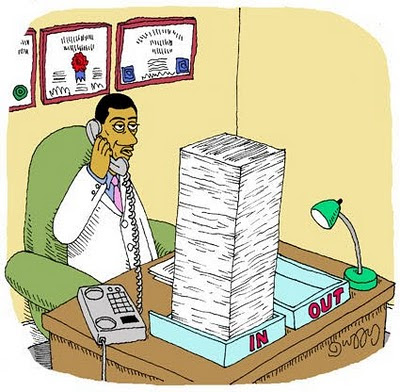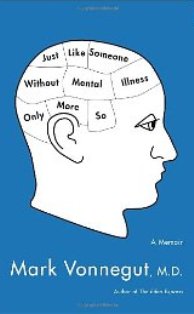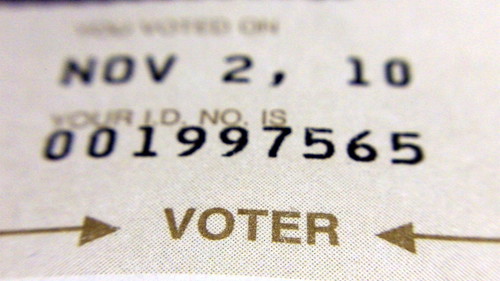December 6th, 2010 by Dinah Miller, M.D. in Better Health Network, Health Policy, News
No Comments »


 The American Medical Association (AMA) had a press release [recently] announcing findings from their survey on the impact of insurance company preauthorization policies.
The American Medical Association (AMA) had a press release [recently] announcing findings from their survey on the impact of insurance company preauthorization policies.
Surprisingly, they discovered that these policies use physician time and delay treatment. It’s funny, because preauthorization policies were designed to save money. And I imagine they do, for the insurer, but they cost money for everyone else. Read more »
*This blog post was originally published at Shrink Rap*
November 26th, 2010 by Dinah Miller, M.D. in Better Health Network, Health Policy, Humor, Opinion, True Stories
No Comments »


 Awhile back I put up a YouTube audio that I thought was funny. A commenter didn’t like it and felt it promoted stigma. So I took a vote, and while most people were fine with it, a number did not like it, and I took the post down. We received this note, and I thought it was substantial enough to be its own guest post (with permission, of course).
Awhile back I put up a YouTube audio that I thought was funny. A commenter didn’t like it and felt it promoted stigma. So I took a vote, and while most people were fine with it, a number did not like it, and I took the post down. We received this note, and I thought it was substantial enough to be its own guest post (with permission, of course).
——————
Hi. I am a practicing psychiatrist based in New York City. I find your blog interesting, informative, and, at times, funny. Now, can you guess which entry I’d like to comment on?
Mel Brooks once said (paraphrased) that if you slip on a banana peel and land on your butt, it’s comedy. If I fall down a flight of stairs, it’s tragedy. I’ve had a long-term interest in humor, and a brief career as an unpaid stand-up comic in L.A. (Brief because my bombing to “killing” ratio was about 15 to one.) With respect to my experience as a therapist, I now occasionally utilize humor in my treatment, but only extremely judiciously once I have gotten to know my client. I learned my lesson early.
At the beginning of my residency training, during my second session with a client, I commented that perhaps he felt like Groucho Marx when Groucho said that he “wouldn’t want to be a member of any club with standards low enough to accept [him].” I sat back, feeling as if I had made the interpretation of the century, and waited for a reaction. I got one. Read more »
*This blog post was originally published at Shrink Rap*
November 16th, 2010 by Dinah Miller, M.D. in Better Health Network, Book Reviews
No Comments »


 I’ll cut to the chase: I loved this book. Five stars. Two thumbs up.
I’ll cut to the chase: I loved this book. Five stars. Two thumbs up.
When I read books, especially psychiatry books that I write about on Shrink Rap, I often read more carefully and sometimes more critically. I was so immersed in reading “Just Like Someone Without Mental Illness Only More So” that I didn’t stop to think, I just went on the journey.
Mark Vonnegut is a pediatrician and the son of my favorite author when I was in junior high school. His memoir is a poignant and candid account of his struggles with, well, life in general, and life with a psychotic illness in particular. Schizophrenia, bipolar disorder — who knows? (I’ll vote for bipolar disorder.) Some illness where he had three episodes in his twenties, then another episode 14 years later.
Thorazine and lithium and megavitamins and psych wards. Xanax and alcohol and how humiliating it is to be psychotic on a stretcher in the ER hallway of the hospital where he works. Divorce and remarriage. First and second families. Childhood as the son of a financially struggling, not-yet-famous eccentric writer, and adulthood as the son of an icon. Vonnegut is a hippy, a mainstream doctor, a middle-aged softball player, then finally a guy who accidentally poisons himself with wild mushrooms. Read more »
*This blog post was originally published at Shrink Rap*
November 3rd, 2010 by Steven Roy Daviss, M.D. in Better Health Network, Health Policy, Opinion
No Comments »


 Back in the 1970s, Kansas passed a law that could prevent people with mental illness from voting. The law was never used, but advocates were successful in getting an amendment passed that revoked that law.
Back in the 1970s, Kansas passed a law that could prevent people with mental illness from voting. The law was never used, but advocates were successful in getting an amendment passed that revoked that law.
This law was passed at a time when stigma against mental illness was much higher than now. I’m guessing it was presumed that folks with a mental illness could not reason enough to exercise an informed vote, which is not true, of course. If 1outta5 have a psychiatric illness, including anxiety, depression, and substance abuse, then there could have been a huge swath of disenfranchised voters.
And there already exists, to a degree, a basic cognitive test for voting: Navigating the whole ballot process. In Maryland, ours was electronic and no harder to use than an iPad, but I could still imaging some with severe dementia unable to navigate the system. But there should never be a cognitive bar one must pass to vote. The challenge would be where to draw the line.
*This blog post was originally published at Shrink Rap*
October 27th, 2010 by AnneHansonMD in Better Health Network, Health Policy, News, Opinion, Research
No Comments »


 For new readers, it’s my tradition to put up posts summarizing tidbits I picked up at the annual American Academy of Psychiatry and Law (AAPL) conference. It’s random, it’s not explained in detail, but it’s stuff I thought was interesting.
For new readers, it’s my tradition to put up posts summarizing tidbits I picked up at the annual American Academy of Psychiatry and Law (AAPL) conference. It’s random, it’s not explained in detail, but it’s stuff I thought was interesting.
The conference started out with a keynote speech by AAPL President Stephen Billick. The title of his talk was “Be True To Psychiatry.” His point was that forensic psychiatrists are clinicians first, and that even a forensic evaluation can have therapeutic effects. He cited many examples in his practice in which a criminal or civil evaluation had potential beneficial “side effects” regardless of the forensic opinion. His main point: the forensic psychiatrist’s obligation to be neutral and objective does not preclude kindness. A point well taken, and appreciated.
A session on suicide risk assessment gave a very nice illustration of the basic problem inherent in these assessments: even assuming an “ideal” case situation with a “perfect” psychiatrist, a thorough suicide risk assessment would take four hours. Risk assessment is time consuming and inherently will be incomplete. We make the best decisions we can based on the limited data we have at the time. Read more »
*This blog post was originally published at Shrink Rap*

The American Medical Association (AMA) had a press release [recently] announcing findings from their survey on the impact of insurance company preauthorization policies.














